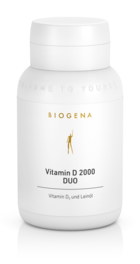You might not know it from the weather right now, but autumn is just around the corner once again and with it darker, shorter days and the associated lethargy and fatigue. Now is the perfect time to tank up for the cold season and to give your body the support it needs. If you follow a few important steps, the autumn blues will have no chance this year!
What can you do to prevent fatigue in autumn?
More light to fight excess sleep hormones
When the days grow shorter and it gets dark outside, the body produces less mood-lifting hormones, since daylight influences our hormone balance. The melanopsin protein is contained in the light receptors of the eyes. When it perceives light, it becomes active and prevents the formation of melatonin. When it gets dark, however, melanopsin is not activated and we produce more melatonin. This “sleep hormone” is the cause of fatigue and lethargy. It is therefore especially important to spend some time outdoors during the day as often as possible. You can take the opportunity, for example, to get off the bus one stop early on the way to work and walk the rest of the way, or to spend the lunch break outdoors and go for a short walk. That will be enough to make you feel noticeably fresher for the rest of the day.
Keep vitamin D levels constant
In addition to the increased formation of melatonin, our body struggles during the darker period of the year with the difficult production of the sun vitamin D. In Central Europe from September to April, the sun’s altitude is too low to effectively produce Vitamin D. Vitamin D, for example, is urgently required by our body to maintain a functioning immune system. Therefore especially during the autumn and winter months a dietary supplement is recommended in order to maintain Vitamin D levels.
Magnesium to fight the autumn blues
Improved performance and magnesium go together. A well-nourished body is a healthy body. Athletes have long valued the micronutrient magnesium, since it is involved in many metabolic processes. Among other things, magnesium contributes to the maintenance of normal muscle functions and a normal electrolyte balance. What is less known, is that this mineral also makes an important contribution to both normal mental functions and energy metabolism. Magnesium – a valuable tip against autumn fatigue!
Basic care for wellbeing
Various micronutrients can also passively support vitality and wellbeing. Sufficient intake of various B vitamins (thiamine, B2, niacin, B6, biotin, B12), supports normal nerve function. Vitamin B6 provides above all for mental wellbeing, as does vitamin B9, also known as folic acid. Stable iron and vitamin C levels can also contribute to the reduction of fatigue and tiredness. Nature has already considered this need which is why typical winter vegetables such as green cabbage, red beetroot or savoy cabbage – contain many of these nutrients.
Soothe your spirit
You can also take pleasure in the positive aspects of autumn: the cold and foggy autumn evenings invite you to spend time on yourself. You might, for example, take a walk in the woods with the colourful leaves crackling underfoot, practice yoga or enjoy a cup of tea with spices – such as ginger, cinnamon and cardamom – that warm you from the inside. Following an exciting summer, use the opportunity to take things easy again and help your body to relax and recharge its batteries.











